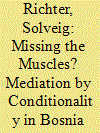| Srl | Item |
| 1 |
ID:
179377


|
|
|
|
|
| Summary/Abstract |
For Europe, the Iran nuclear deal is a bittersweet story. Between 2003 and 2015, the Europeans played an important role in facilitating US-Iran nuclear diplomacy and eventually the agreement itself. After former US President Trump decided to exit the deal and revert to maximum economic pressure in 2018, the Europeans tried to recreate room for US-Iran engagement. While unsuccessful, they have nonetheless managed to remain relevant for both sides. The prospect of normalised economic relations with Europe has provided Iran with an incentive not to pursue nuclear weapons. As for the US, the nuclear deal – which still exists formally thanks to Europe – is the only framework available for re-engaging Iran in nuclear diplomacy, a prospect the new administration of Joe Biden has pledged to consider. Dismissing Europe’s efforts as ineffectual is therefore inaccurate since, in defending the nuclear deal, the Europeans have preserved a diplomatic bridge for US-Iranian re-engagement.
|
|
|
|
|
|
|
|
|
|
|
|
|
|
|
|
| 2 |
ID:
159779


|
|
|
|
|
| Summary/Abstract |
In October 2009, the European Union, in conjunction with the United States, launched a high-level mediation effort in Butmir, Bosnia and Herzegovina, to reform the political structure of the state. Since 2005, the constitution which was included in the Dayton Peace Accord has been widely perceived as dysfunctional. In two negotiation rounds, the EU and the US put a comprehensive proposal on the table and showed strong leverage. However, the talks ended without a tangible result. To explain this failure, a theoretical model is developed based on both mediation and Europeanization literature to explore mediation by conditionality as a type of ‘directive mediation’ in a systematic way. Contrary to the argument that the EU lacked muscle, it is argued that pre-conditions for political conditionality were not fulfilled and strong leverage proved ineffective and counterproductive. These results question conditionality as an effective mediation strategy when state-building is contested between local parties.
|
|
|
|
|
|
|
|
|
|
|
|
|
|
|
|